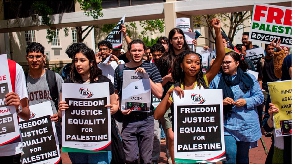 Demonstrators hold placards in support of Palestine in Stellenbosch, South Africa
Demonstrators hold placards in support of Palestine in Stellenbosch, South Africa
On November 21, the South African Parliament voted to cut diplomatic ties with Israel over the war in Gaza. The fighting was ignited on October 7, when Hamas fighters crossed into Israel, killed 1,200 people and took as hostages 250 others, including babies and toddlers.
The deadly Hamas incursion caught Israel flat-footed. It took the Israel Defence Forces an incredible 12 hours to respond to the massacres going on in their country.
Israel responded with fury. Its bombing campaign did not spare hospitals, ambulances, and schools. The bombardment has left huge swathes of Gaza resembling scenes from an apocalyptic movie.
Many countries, some of which had initially supported Israel’s right to defend itself, back-tracked and called for an immediate halt to the war. Some of them recalled their ambassadors to Israel.
South Africa’s parliament voted to cut ties with Israel altogether. It is now up to President Cyril Ramaphosa and his Cabinet to consider the parliamentary vote and decide whether or not to break off diplomatic ties with Israel.
It is South Africa’s prerogative to decide whether, after weighing the pros and cons, of its relationship with Israel, to opt for divorce. States leverage diplomatic ties with more technologically and economically advanced countries to get better terms of trade, technology transfer, financial assistance, educational and training opportunities for its citizens, and moral or military support in case of disputes with neighbors.
Should South Africa choose to sever ties with Israel, it will lose this leverage. Furthermore, as a crucial member of the African Union and the Brics grouping, it will lose the leverage to influence the Israeli-Palestinian peace process. But more fundamentally, severing ties or the vote to do so reminds those of us in Africa of South Africa’s wayward foreign policy. What values or principles is South Africa’s diplomacy based on?
In 2020, South Africa summoned the US ambassador to Pretoria to strongly protest the killing of George Floyd by a white policeman. Around the same time, Uganda police killed 50 people protesting the arrest of a presidential candidate. In one instance, police riding on a truck were caught on camera shooting randomly into a crowd of hawkers who were not even part of the protests.
South Africa was quiet as a mouse. Even more disturbingly, South Africa opposed the indictment of Omar al-Bashir by the International Criminal Court over the killing of an estimated 200,000 people in Darfur.
South Africa was an ardent supporter of Robert Mugabe during his ruinous reign. South Africa has never summoned any ambassador over human rights abuses on the continent or the plunder of public resources by African leaders. South Africa gives succor to the despots and thieves using redundant Pan-Africanist and nationalist arguments.
As the most institutionalised democracy in Africa, and the home of Nelson Mandela and Desmond Tutu, South Africa’s policy towards Africa should inspire and instigate an African democratic and economic renaissance, not comfort dictators.